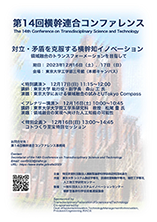Current issue
Displaying 1-50 of 78 articles from this issue
Program
-
Article type: Program
Pages 0-0-
Published: 2023
Released on J-STAGE: March 07, 2024
Download PDF (5501K)
-
Session ID: A-1
Published: 2023
Released on J-STAGE: March 07, 2024
Download PDF (462K) -
Session ID: A-1
Published: 2023
Released on J-STAGE: March 07, 2024
Download PDF (503K) -
Session ID: A-1
Published: 2023
Released on J-STAGE: March 07, 2024
Download PDF (486K) -
Session ID: A-1
Published: 2023
Released on J-STAGE: March 07, 2024
Download PDF (746K) -
Session ID: A-1
Published: 2023
Released on J-STAGE: March 07, 2024
Download PDF (263K) -
Session ID: A-1
Published: 2023
Released on J-STAGE: March 07, 2024
Download PDF (321K)
-
Session ID: B-1
Published: 2023
Released on J-STAGE: March 07, 2024
Download PDF (1678K) -
Session ID: B-1
Published: 2023
Released on J-STAGE: March 07, 2024
Download PDF (956K) -
Session ID: B-1
Published: 2023
Released on J-STAGE: March 07, 2024
Download PDF (763K) -
Session ID: B-1
Published: 2023
Released on J-STAGE: March 07, 2024
Download PDF (435K) -
Session ID: B-1
Published: 2023
Released on J-STAGE: March 07, 2024
Download PDF (1202K) -
Session ID: B-1
Published: 2023
Released on J-STAGE: March 07, 2024
Download PDF (739K)
-
Session ID: C-1
Published: 2023
Released on J-STAGE: March 07, 2024
Download PDF (404K) -
Session ID: C-1
Published: 2023
Released on J-STAGE: March 07, 2024
Download PDF (1548K) -
Session ID: C-1
Published: 2023
Released on J-STAGE: March 07, 2024
Download PDF (1813K)
-
Session ID: D-1
Published: 2023
Released on J-STAGE: March 07, 2024
Download PDF (282K) -
Session ID: D-1
Published: 2023
Released on J-STAGE: March 07, 2024
Download PDF (500K) -
Session ID: D-1
Published: 2023
Released on J-STAGE: March 07, 2024
Download PDF (742K)
-
Session ID: E-1
Published: 2023
Released on J-STAGE: March 07, 2024
Download PDF (1804K) -
Session ID: E-1
Published: 2023
Released on J-STAGE: March 07, 2024
Download PDF (882K)
-
Session ID: A-2
Published: 2023
Released on J-STAGE: March 07, 2024
Download PDF (597K) -
Session ID: A-2
Published: 2023
Released on J-STAGE: March 07, 2024
Download PDF (382K) -
Session ID: A-2
Published: 2023
Released on J-STAGE: March 07, 2024
Download PDF (765K) -
Session ID: A-2
Published: 2023
Released on J-STAGE: March 07, 2024
Download PDF (1312K) -
Session ID: A-2
Published: 2023
Released on J-STAGE: March 07, 2024
Download PDF (458K) -
Session ID: A-2
Published: 2023
Released on J-STAGE: March 07, 2024
Download PDF (2534K)
-
Session ID: B-2
Published: 2023
Released on J-STAGE: March 07, 2024
Download PDF (549K) -
Session ID: B-2
Published: 2023
Released on J-STAGE: March 07, 2024
Download PDF (746K) -
Session ID: B-2
Published: 2023
Released on J-STAGE: March 07, 2024
Download PDF (1226K) -
Session ID: B-2
Published: 2023
Released on J-STAGE: March 07, 2024
Download PDF (619K)
-
Session ID: C-2
Published: 2023
Released on J-STAGE: March 07, 2024
Download PDF (1276K) -
Session ID: C-2
Published: 2023
Released on J-STAGE: March 07, 2024
Download PDF (617K) -
Session ID: C-2
Published: 2023
Released on J-STAGE: March 07, 2024
Download PDF (397K) -
Session ID: C-2
Published: 2023
Released on J-STAGE: March 07, 2024
Download PDF (535K)
-
Session ID: D-2
Published: 2023
Released on J-STAGE: March 07, 2024
Download PDF (559K) -
Session ID: D-2
Published: 2023
Released on J-STAGE: March 07, 2024
Download PDF (960K) -
Session ID: D-2
Published: 2023
Released on J-STAGE: March 07, 2024
Download PDF (1856K) -
Session ID: D-2
Published: 2023
Released on J-STAGE: March 07, 2024
Download PDF (413K) -
Session ID: D-2
Published: 2023
Released on J-STAGE: March 07, 2024
Download PDF (800K)
-
Session ID: E-2
Published: 2023
Released on J-STAGE: March 07, 2024
Download PDF (997K) -
Session ID: E-2
Published: 2023
Released on J-STAGE: March 07, 2024
Download PDF (739K) -
Session ID: E-2
Published: 2023
Released on J-STAGE: March 07, 2024
Download PDF (516K) -
Session ID: E-2
Published: 2023
Released on J-STAGE: March 07, 2024
Download PDF (794K) -
Session ID: E-2
Published: 2023
Released on J-STAGE: March 07, 2024
Download PDF (311K)
-
Session ID: A-3
Published: 2023
Released on J-STAGE: March 07, 2024
Download PDF (538K) -
Session ID: A-3
Published: 2023
Released on J-STAGE: March 07, 2024
Download PDF (364K) -
Session ID: A-3
Published: 2023
Released on J-STAGE: March 07, 2024
Download PDF (293K) -
Session ID: A-3
Published: 2023
Released on J-STAGE: March 07, 2024
Download PDF (272K) -
Session ID: A-3
Published: 2023
Released on J-STAGE: March 07, 2024
Download PDF (526K)
